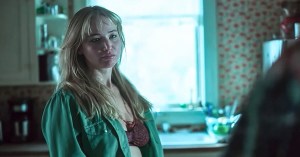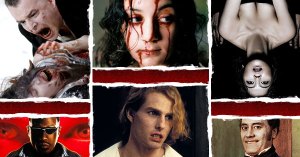Know Your Critic: Pop Culture Writer Kristen Lopez
Lopez talks digital criticism, representation, an under the radar writer-director duo, and the movie that made her who she is.

(Photo by IFC Films, Sony Pictures Entertainment, MGM)
“Know Your Critic” is a new column in which we interview Tomatometer-approved critics about their screening and reviewing habits, pet peeves, and personal favorites.
Kristen Lopez is a culture writer, classic film expert, and an advocate for fellow critics. She draws attention to disability representation and the lack of accessibility in many theaters she visits for screenings. She’s determined to not be the only person people think of when they hear “disability” and “criticism” in the same sentence.
“I don’t speak for everybody, and I would love to have more disabled critics that I could disagree with and be like, No, you’re wrong,” she told Rotten Tomatoes. “I can’t speak for every single disability in the world. There is only so much time in the day that I can devote to writing, I can’t hit everything. I need some other critics to help share the load with me.”
Last year, Lopez contributed to Rotten Tomatoes’ first book, Rotten Movies We Love. Her take on The Greatest Showman – as with many of her reviews – suggests that our reactions to movies are personal, even sometimes contradictory, when it comes to style and story. “As a disabled person, it’s so flawed and ableist, but I love the music and the flash,” she told Rotten Tomatoes.
Lopez is a Los Angeles-based pop culture writer whose work can be found at Culturess, Forbes, The Movie Isle, Citizen Dame, and Remezcla, among many others.
How do you watch award shows?
For the first time last year, I watched the Oscars by myself. It was very, very odd, but it allowed me to sit in my pink PJs and eat sushi and yell at the TV, which was nice… I feel like award shows are not something you need to endure alone. You should have friends. Especially when things go wrong.
What’s your favorite screening snack?
I’m an M&Ms person. I need to have something to keep my mind focused on a movie, and M&Ms are one of those where I can just – I’m sure annoying to whoever I’m sitting next to – I can roll them around in my mouth and have something to focus on.
Do you have a movie theater pet peeve?
It’s the people that buy the handicap companion seat that they don’t need… I’ve been fortunate that if I ask somebody to move, nine times out of 10, they’ll be like, “Okay” – but that’s always my pet peeve.
You’re sitting down to write. Do you prefer a shot of alcohol or espresso, and what is your spirit of choice?
I’m a writer, so I can either be an alcoholic or drink coffee, and I prefer to not be an alcoholic, so I drink coffee.
Do you read other reviews before or after watching something?
I will read reviews after I’ve already seen something, mostly because I want to know if I am completely nuts liking or not liking something. I’m like, “What is everybody else saying?” Then I’ll see that they’re all in love with the movie and I’m sitting there thinking like, “Okay, well, what’s wrong with me? I didn’t like it.”

(Photo by IFC Films)
Is there an under-the-radar director or screenwriter that you think more people should know about?
For me, it’s the team of Mary Harron and Guinevere Turner. They’ve been around forever, but I feel like every time they have something out, people are like, “Oh, yeah. Why are they not doing more?” I say, “Well, they are. It’s just they’re not working with the big studio people yet.” Charlie Says is a really different type of Manson movie that’s really feminist and biting about the misogyny and racism of that time, and it’s awesome.
What do you think is the biggest misconception about critics?
The biggest misconception is that we hate movies – we only got into this to gripe about things we can’t do, and I have to laugh. I never wanted to be a director. I’ve never wanted to be a screenwriter. I love appreciating films and I love talking about them, especially in the last couple of years where I’ve written about representation and disability. My goal now is I want to talk about movies that should be doing more or are doing really great when it comes to representation that nobody’s talking about.
I did not get into this business to work long hours, not make a ton of money, and just be berated on Twitter because I hate films. I got into this because I love movies and I love appreciating them and hopefully influencing somebody to go see something that I love.
Is there someone in your life who is not a critic whose opinion you admire?
I think as much as I’d like to say I am my own autonomous person and no one else’s opinion is better than mine, I’ll still be like, “Mom, did you think that movie was good?”

(Photo by MGM)
What is your favorite classic film?
Oh, gosh. So many. I love Singin’ in the Rain and Meet Me in St. Louis. It’s a smaller film, but I got to throw out there, too – it’s called On an Island with You. It would never be remade today because it is the story of a guy who knows in his heart that a woman loves him, so he proceeds to kidnap her and put her on a remote island to make her love him by any way, shape, or form, and it’s a romance and it’s delightful. It’s like one of those color spectacles with Esther Williams swimming and it’s a lot of fun, but it is so problematic.
Is there an actor, director, or screenwriter whose work you always love?
If we’re talking directors, Sofia Coppola. For better or worse, I know that her movies definitely cater to white girls who haven’t really grown out of their teenage dreams, and that’s very much me, so I love her. Actors, the running joke with my friends is that if it’s Oscar Isaac or Jon Bernthal, I will be there no matter what movie it is.
Who are some fellow critics whose work you admire?
When I was younger and I was first starting out, I always talked about the A.O. Scotts and the Peter Traverses and I realized very late in my life, I was like, “They’re all men. Why do I only gravitate toward male writers?”
It’s been a learning process for me to find female critics and people that I do admire, so the April Wolfes, and the Emily VanDerWerffs. Those are the people that I definitely look up to because they are coming at film from marginalized perspective. It’s laying the groundwork for me to go there and talk about a completely different road of thought.

(Photo by Sony Pictures Home Entertainment)
What is your favorite movie from your childhood?
Oh, My Girl. I became an English major because I watched that as a child and I thought Griffin Dunne was the most gorgeous person in the entire world, and I figured if I became an English major, then I would find someone that looked like him. That was a lie, but I did it anyway. My Girl is the reason that I am the way that I am.
Do you have advice for critics who are still finding their voice?
I’ve been told by people that “nobody goes to the movies to go see reality,” and I say, “Well, that’s not true.” People want to see something that reminds them of them, something that they can relate to, and if your perspective is to look at a film from a trans perspective or a disabled perspective or a race perspective, that’s valuable.
I always say that if you have something, a voice or a thought or an angle that you want to explore with a film, you definitely have every right to put that out there. Nine times out of 10, you’ll find somebody who is the exact same way.
How has the digital landscape influenced your criticism?
It’s funny. I had somebody tell me, “One day you’ll work in a big magazine office,” and I was like, “Not necessarily,” because at the time digital was overtaking print media. But when you are a disabled person, you realize some places aren’t physically prepared for a disabled person to work there. Some places are still not ADA-compliant, so for me, the digital landscape allows me an even playing-field.
What are you most proud of in your career so far?
I’m always proud of the fact that somebody read something I wrote and they learned something. I do have my nerdy stuff – I’ve interviewed some fantastic people that I never in my wildest dreams thought that I’d get to talk to – but for me, it’s the fact that I get to write about disability and be an expert on something. Never did I think that I use a wheelchair and that made me an expert on something, but I’ve been able to use that and have people say to me, “I didn’t think that way, and you’re right. I should be thinking about disabled people.”
The unfortunate fact is that we live in a world now with the way politics are where disabled people are still incredibly marginalized, and I think film is a great conduit to talk about disabled issues, so if somebody reads something I wrote and they say that they’ve learned something from it, I feel like that’s a bigger accomplishment, because teaching somebody like that… I could only have done it with writing.
If your life were a movie, what genre would it be?
Well, I’ve got the reality there where I would just be like, “No one would tell my story because they don’t tell stories about disabled women,” especially not with a sailor’s mouth and my Twitter feed. They’d say, “No, you don’t exist, we’ve never met a disabled woman like you on-screen. Audiences would not understand it.” That’s how I’m assuming Hollywood would be, but I’d like to think that if ableism was not a factor, it would be a comedy.
Kristen Lopez is a freelance pop culture essayist. Find her on Twitter: @Journeys_Film.






